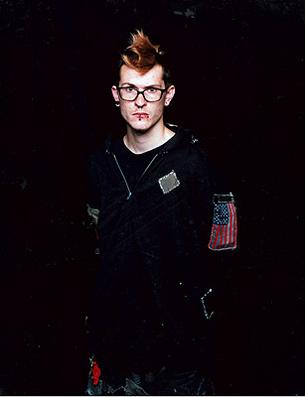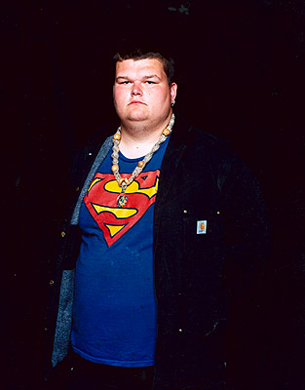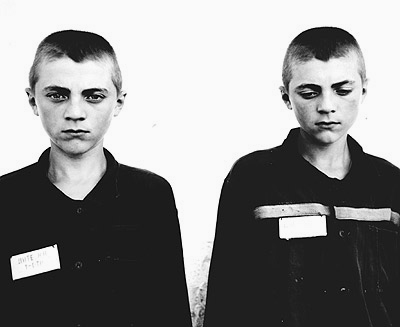
Bradley McCallum & Jacqueline Tarry James August 6th, 2002 1 :01 - 2:00 PM
color photograph, 50" x 40"

Bradley McCallum & Jacqueline Tarry Frost August 6th, 2002 5 :01 - 6:00 PM
color photograph, 50" x 40"
They share a medium and a subject. Both of the shows currently installed in Chelsea's Marvelli Gallery are the product of an artist's camera and both are about young people (sometimes very young people) who have rejected (or been ejected from) a society which will now accept their images filtered as art.
Bradley McCallum and Jacqueline Tarry show large, sensitive almost-full-length color portraits of homeless Seattle teenagers (and young adults who became homeless as teenagers). Their subjects' costumes seemed incredibly stylized to me at first, perhaps almost unbelievable, and the life-sized photographs exhibit such technical beauty that you are likely to be very surprised, as I was the other night, should you hang out in the room a little while longer. The people on those walls will soon begin to seem less picturesque and much more familiar, but there will be little comfort in that development.
Two flat-screen monitors showing the same two-hour video are mounted on opposite walls of the same gallery space, with their starting moments deliberately out of sync. The moving images document 26 people (including among them the few shown in the room's still photographs) as they step up in succession to replace from behind the figure a viewer has been watching standing facing the camera and who now disappears. This takes place on a very ordinary-looking Seattle neighborhood corner, one which may be a central part of these people's world. The central figures are almost motionless, but the pedestrians and vehicles within the camera's frame speed by at a literally regardless pace ten times faster than real life, since the filming was done over a period of 26 hours and the video has been accelerated to occupy only two. The soundtrack consists of excerpts from each of the subjects' individual conversations with Tarry, layered with the low ambient energy of traffic noises.

Ingar Krauss Untitled (2003) gelatin silver print, 33.5" x 41"
In a smaller room at the rear of the gallery Ingar Krauss shows a number of black and white photographs of children and young teenagers who are a part of the Russian penal system today. The subjects alone would guarantee interest, but Krauss's gift manages to raise tragedy to the level of a powerful art which will not be denied here. Unfortunately we can't know whether or how this may help these small victims of society's incompetence.
[images from Marvelli Gallery]